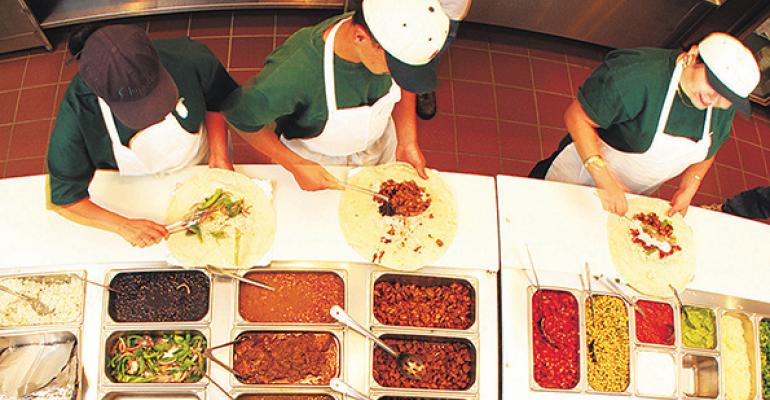Chipotle Mexican Grill Inc. is making changes to its standards for produce suppliers as it improves food-safety protocols in a way that could eliminate some local suppliers next year, the company said Thursday.
Chris Arnold, Chipotle’s communications director, said the company will reveal the new requirements for produce suppliers in coming days.
“Given those changes, we expect that some of our current local produce partners may not meet those new requirements, so we are not sure what the program will look like when it comes back in season next spring,” he said.
Meanwhile, the chain has removed references to the use of local produce on its website, in part because the program is seasonal, running from June through October, and the season is over, Arnold said.
“With that, we removed the online references to the local program simply because we didn’t want to be over promising what the program will include,” said Arnold.
Questions about the changes on the website were raised by Bloomberg news, prompting Chipotle to reveal plans to upgrade its supplier standards.
Chipotle is grappling with the aftermath of an E. coli outbreak that has sickened 45 people in six states as of Nov. 20.
The specific source of the outbreak has not been identified, but produce has been implicated in other recent outbreaks and the Denver-based chain has hired two food-safety consulting firms to assess and improve on procedures.
The fact that victims in the recent E. coli outbreak were reported in states as diverse as California, Washington state, Oregon, Minnesota, Ohio and New York indicates that local sourcing was not likely the problem. But an outbreak of salmonella earlier this year linked to Chipotle restaurants in Minnesota was believed to have been caused by fresh produce.
Chipotle has long been a pioneer sourcing fresh ingredients “from farms rather than factories,” as the company states in its Food With Integrity positioning, and with the welfare of animals and the planet in mind.
The 1,900-unit chain began sourcing produce locally where it could in 2008 and gradually increased the amount of produce used from sources within 350 miles of restaurants each year.
To do that, Chipotle has long boasted of its long-term relationships with suppliers. But setting higher standards for ingredients has also required vigilance in ensuring those suppliers continue to meet the company’s strict standards.
Earlier this year, for example, a pork supplier was suspended after an audit found that the company’s animal welfare standards were not being met. As a result, hundreds of restaurants were forced to go without pork for much of the year until a replacement was found.
Chipotle officials, however, contend that a growing number of suppliers are willing to change their ways to accommodate increasing consumer demand for local and sustainably raised ingredients.
After reporting third-quarter earnings in October, Steve Ells, Chipotle’s chair and co-CEO, said a growing number of pork suppliers have expressed willingness to improve animal welfare practices to meet Chipotle’s standards, for example.
“I am so excited about this encouraging change, particularly when compared to the reaction we received when starting our Food With Integrity program a little more than 15 years ago,” Ells said. “At the time, there was very little pork available that met our requirements. But today, some of the largest agricultural producers are taking a much closer look at the way they raise their animals, and they’re starting to see that we have what we have always believed, that food grown and raised with respect for animals, the environment, farmers and customers simply taste better.”
Contact Lisa Jennings at [email protected].
Follow her on Twitter @livetodineout





